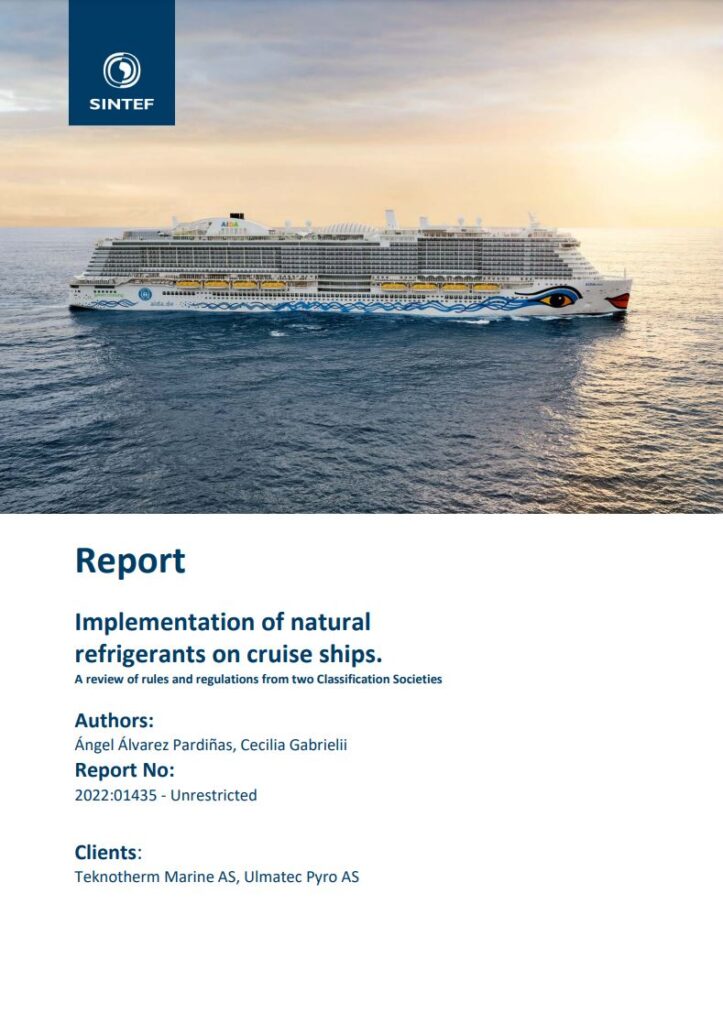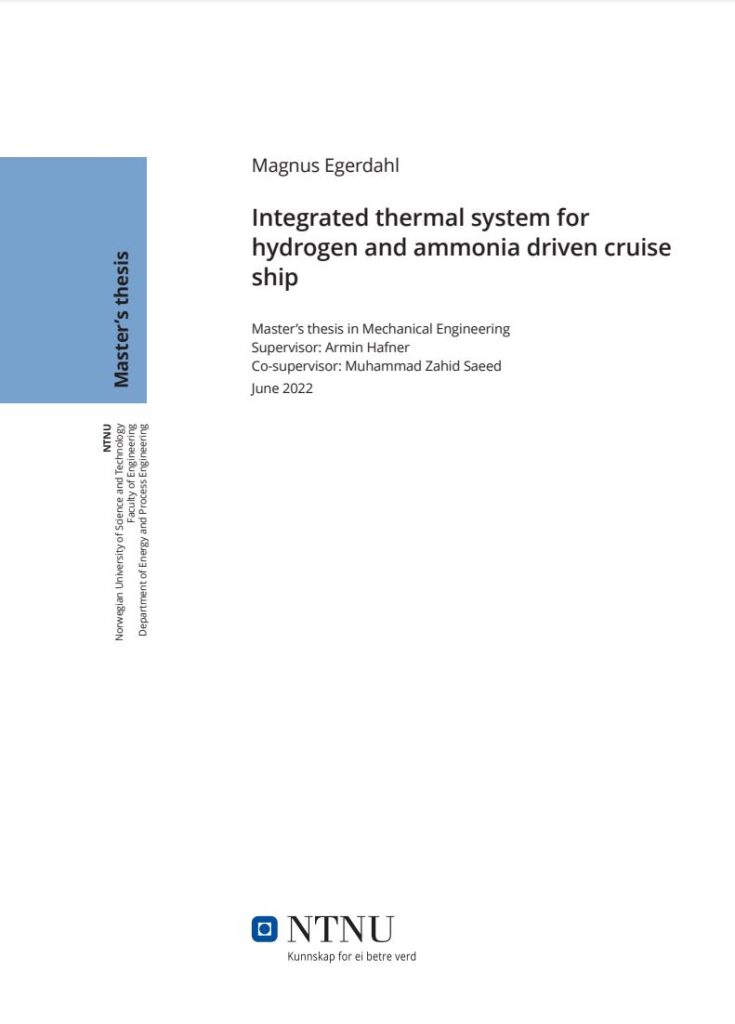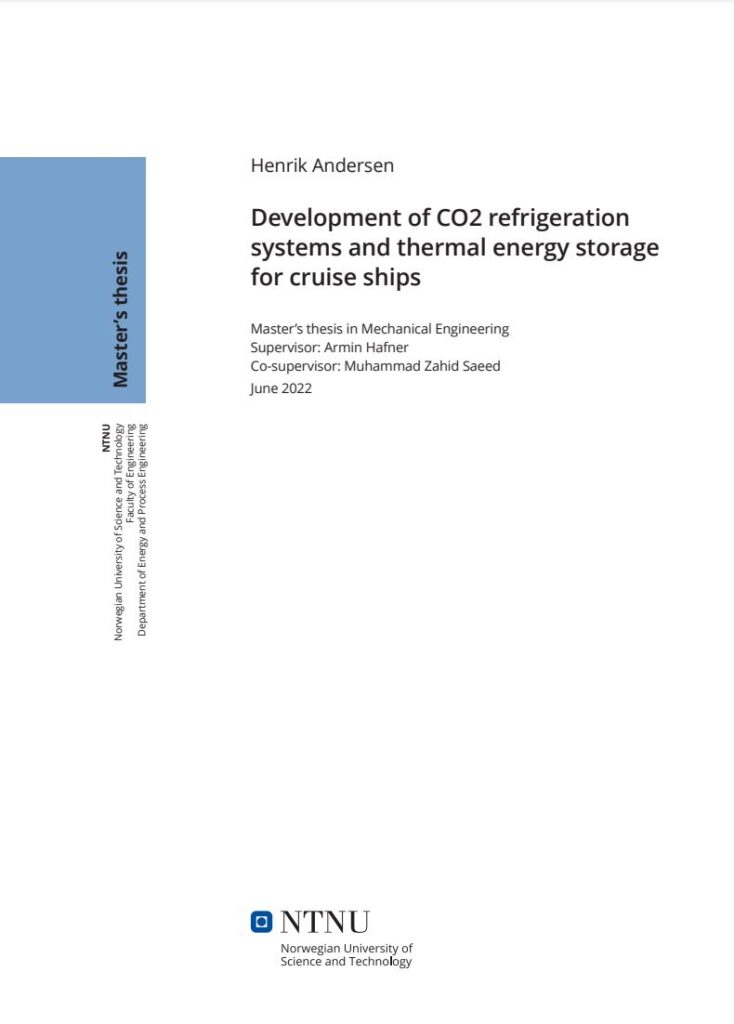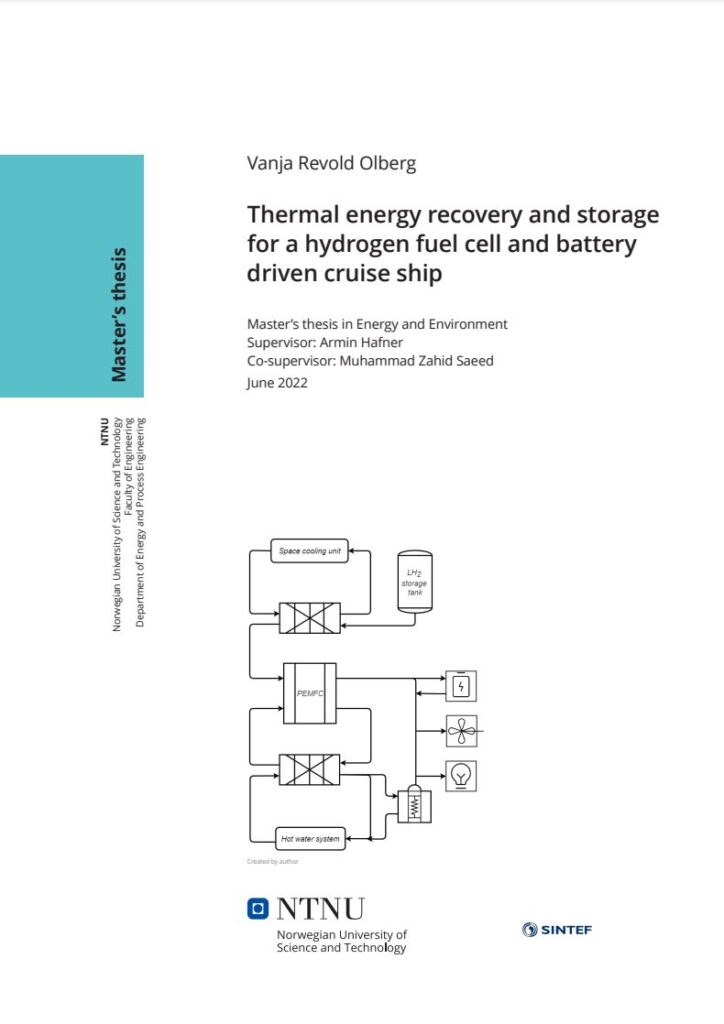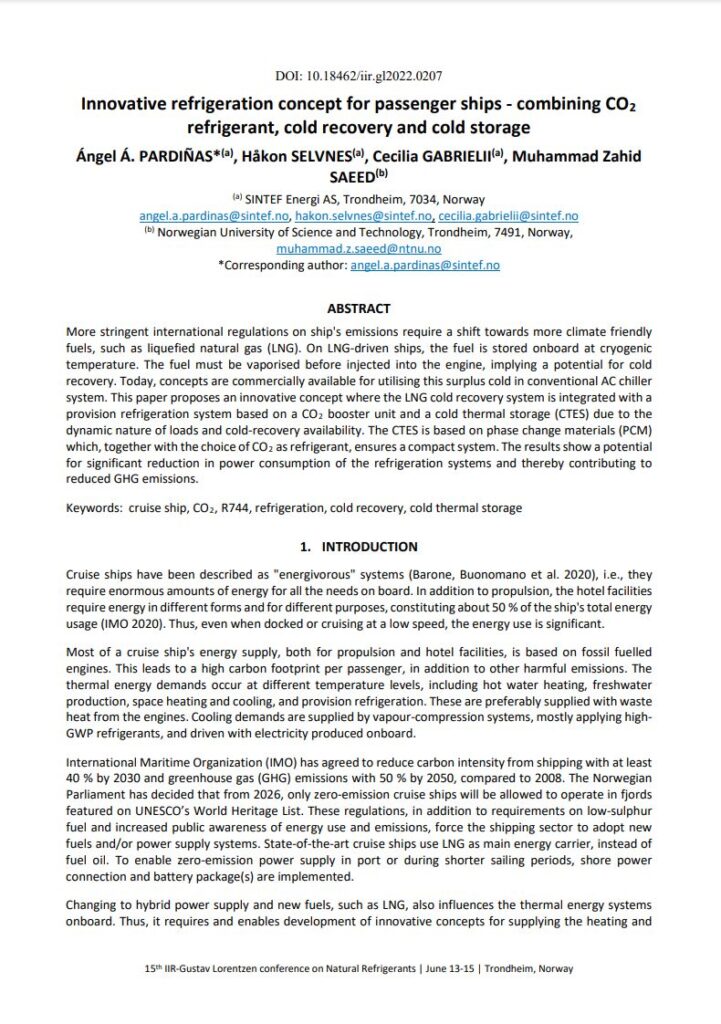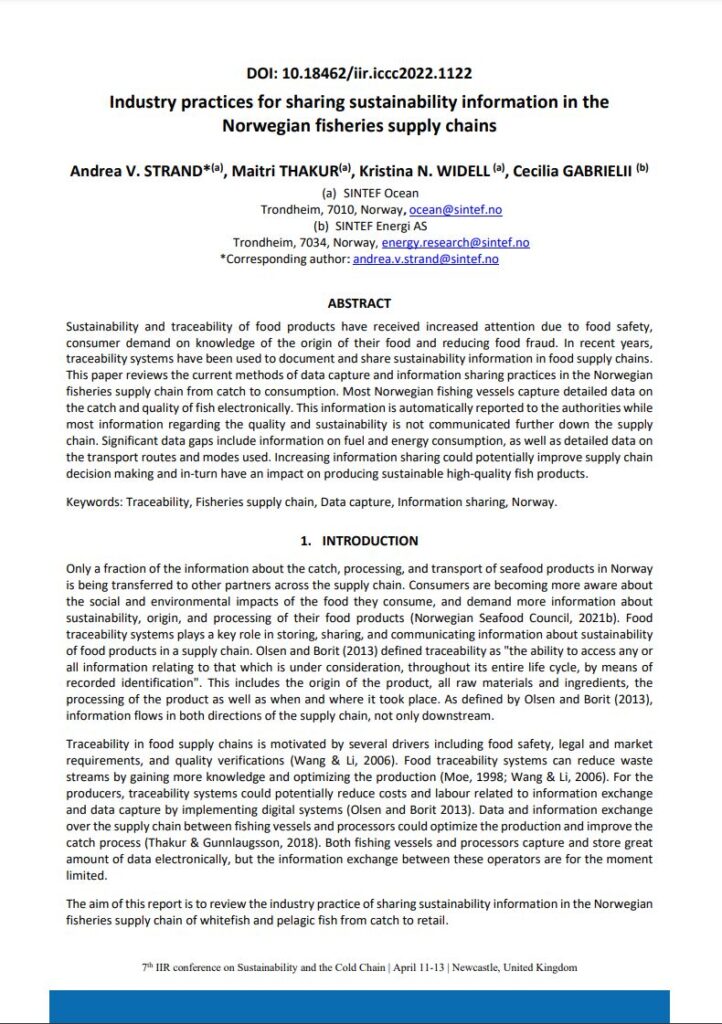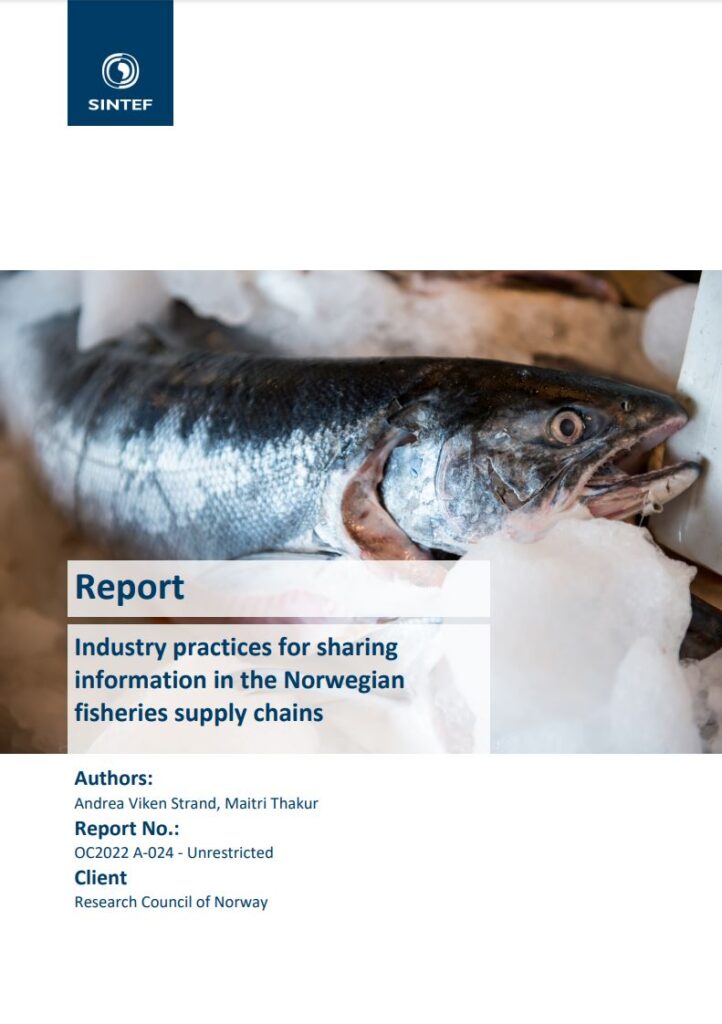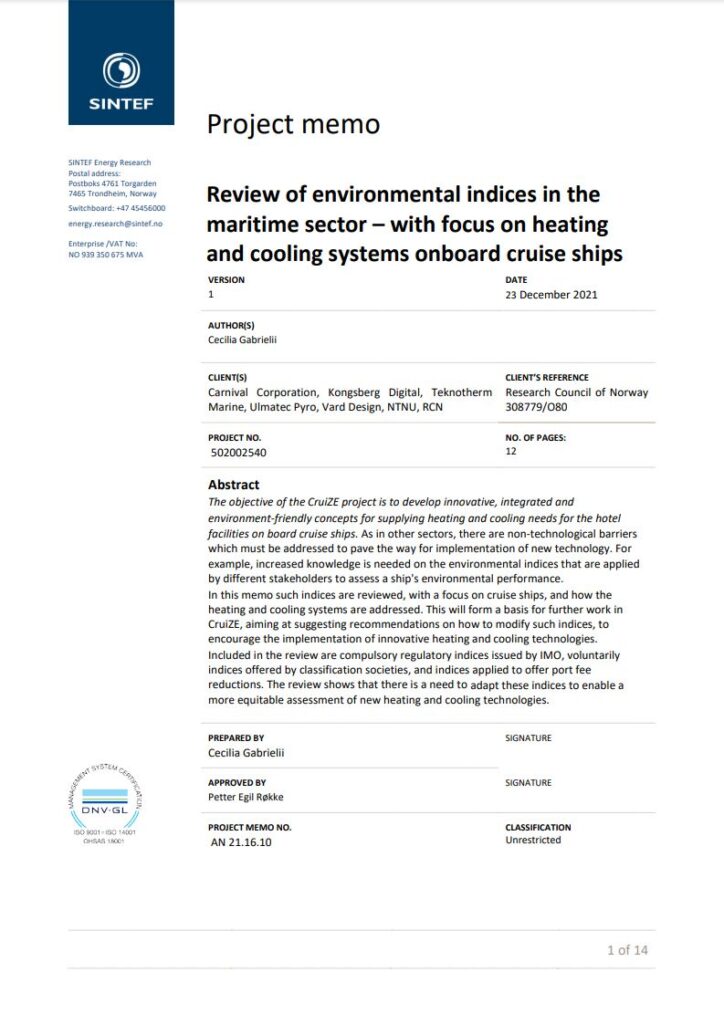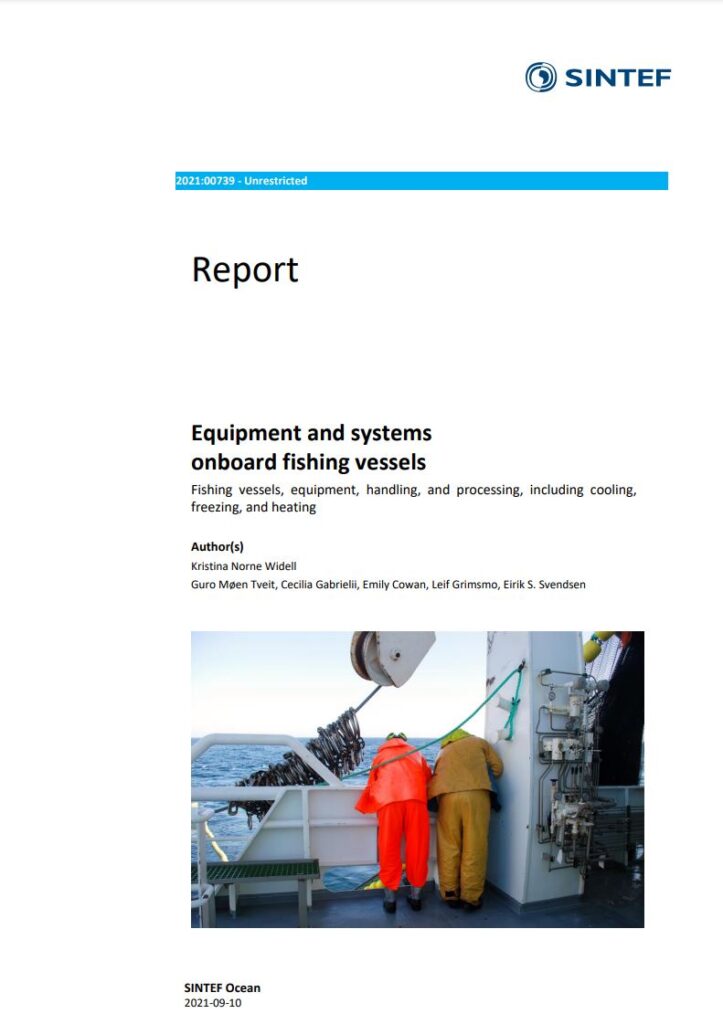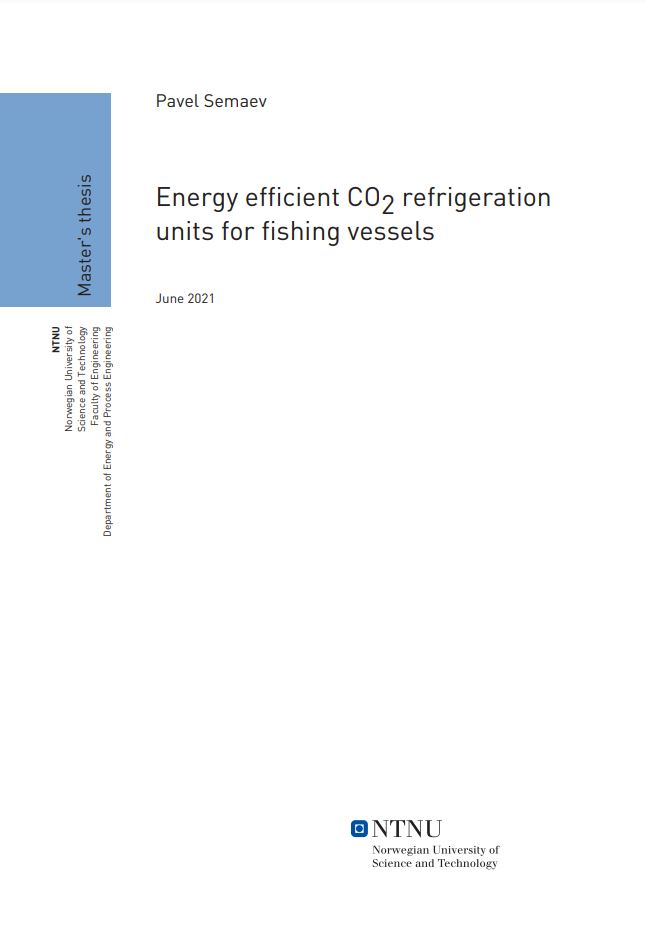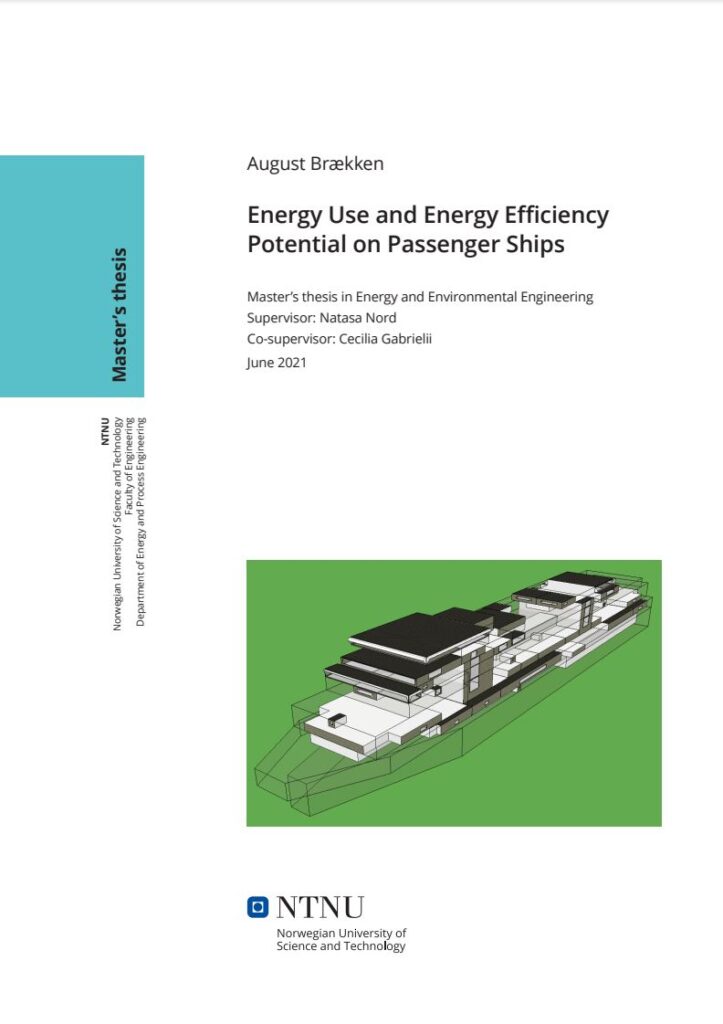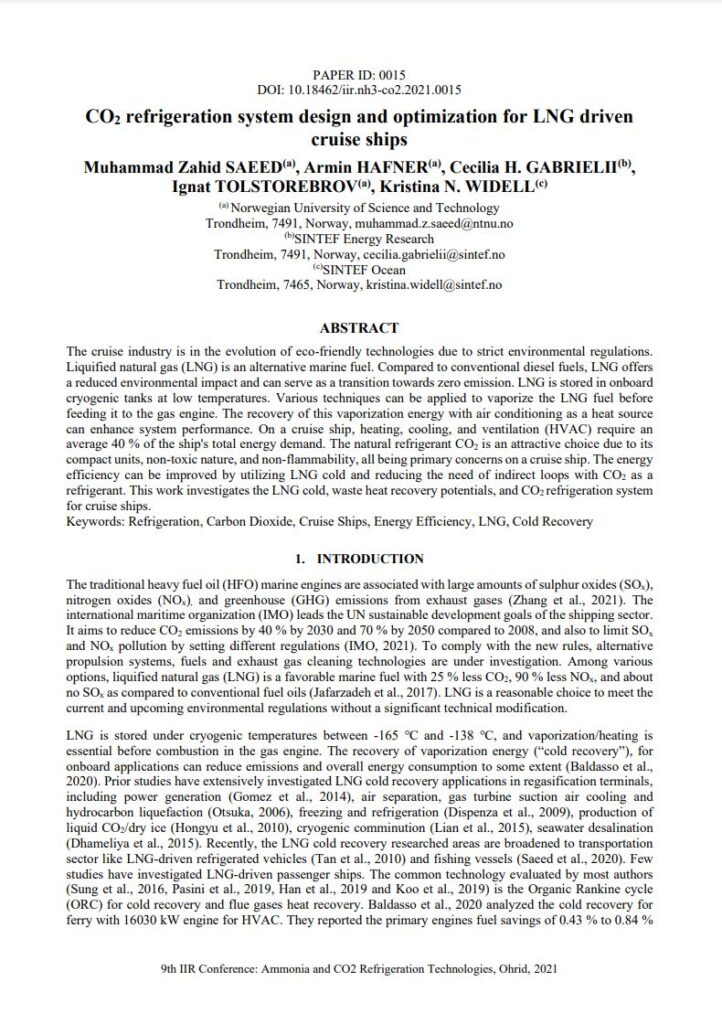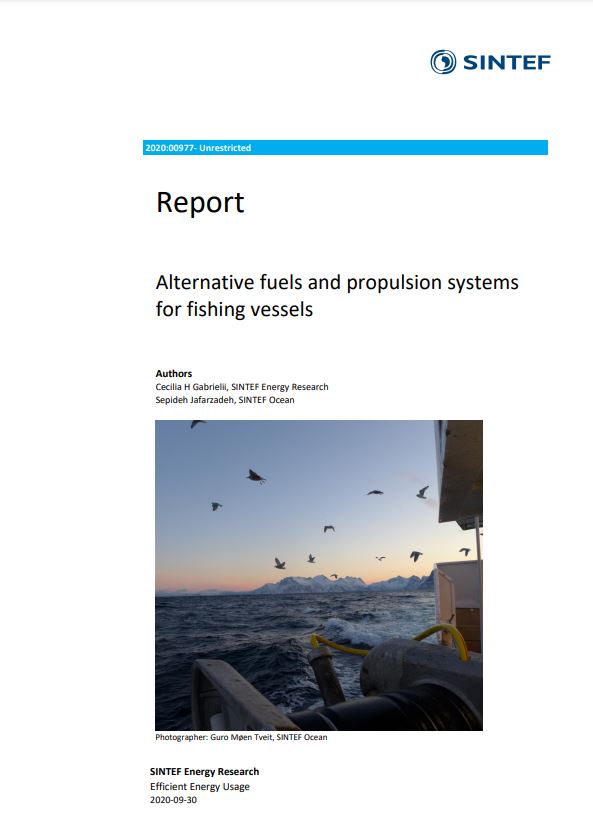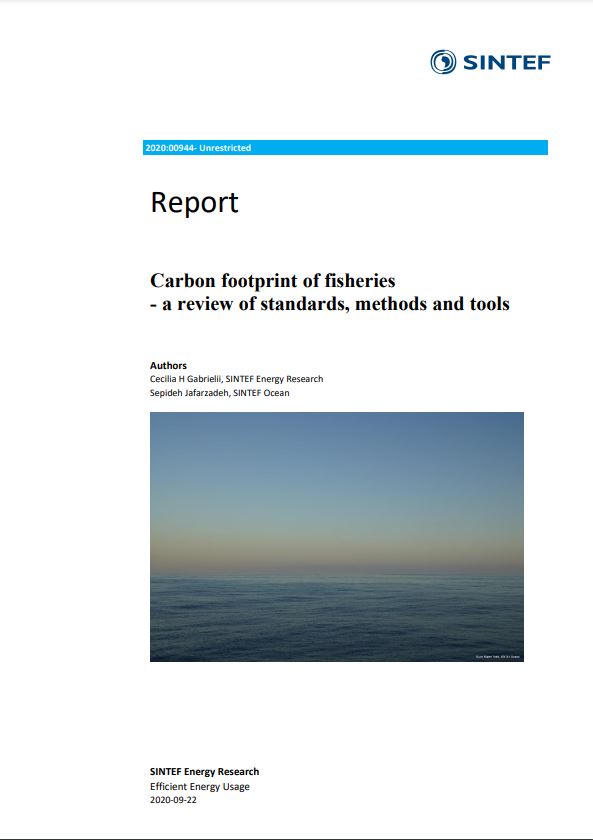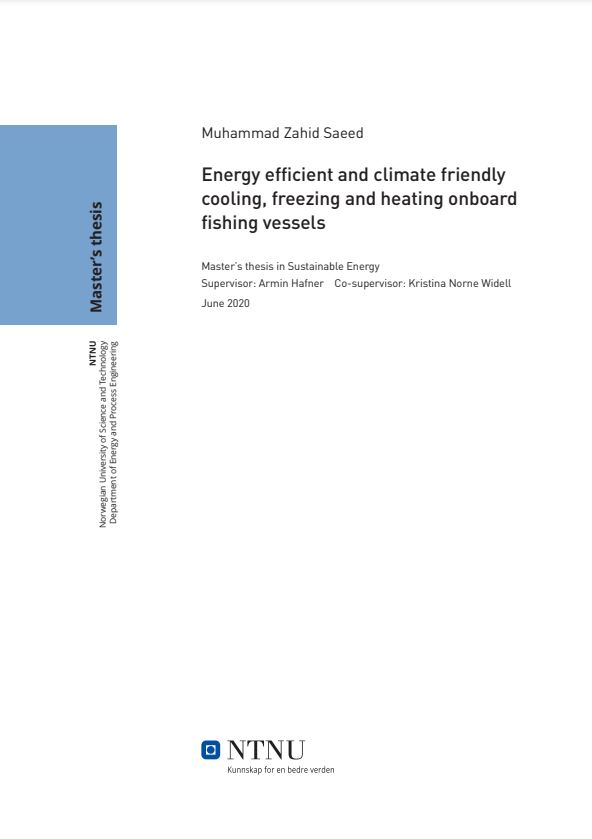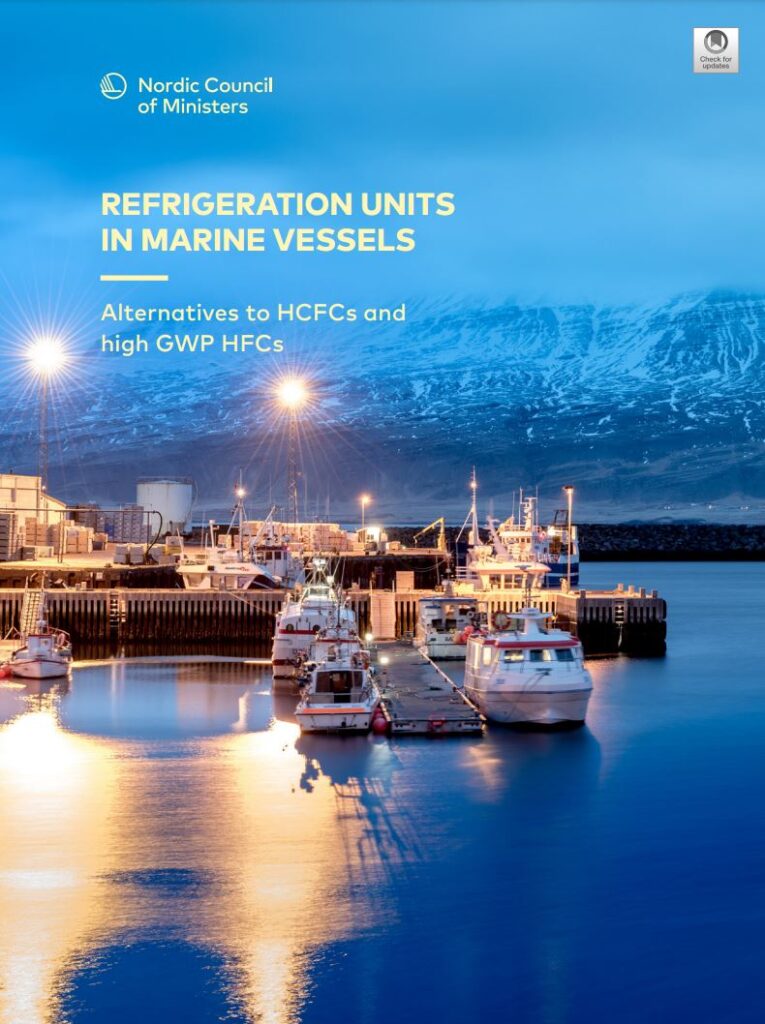Publications
Publications
This is a list of available publications generated in the projects CoolFish and CruiZE. For a short summary, please selected the ‘Detailed’ tab.
Implementation of natural refrigerants on cruise ships. A review of rules and regulations from two Classification Societies
By Ángel Álvarez Pardiñas, Cecilia Gabrielii. Published in/by SINTEF at 2022-12-23.
Sustainability and traceability of food products have received increased attention due to food safety, consumer demand on knowledge of the origin of their food and reducing food fraud. Most Norwegian fishing vessels capture detailed data on the catch and quality of fish electronically. This information is automatically reported to the authorities while most information regarding the quality and sustainability is not communicated further down the supply chain. Significant data gaps include information on fuel and energy consumption, as well as detailed data on the transport routes and modes used.
Integrated thermal system for hydrogen and ammonia driven cruise ship
By Magnus Egerdahl. Published in/by NTNU at 2022-06-15.
Sustainability and traceability of food products have received increased attention due to food safety, consumer demand on knowledge of the origin of their food and reducing food fraud. Most Norwegian fishing vessels capture detailed data on the catch and quality of fish electronically. This information is automatically reported to the authorities while most information regarding the quality and sustainability is not communicated further down the supply chain. Significant data gaps include information on fuel and energy consumption, as well as detailed data on the transport routes and modes used.
Development of CO2 refrigeration systems and thermal energy storage for cruise ships
By Henrik Andersen. Published in/by NTNU at 2022-06-15.
Sustainability and traceability of food products have received increased attention due to food safety, consumer demand on knowledge of the origin of their food and reducing food fraud. Most Norwegian fishing vessels capture detailed data on the catch and quality of fish electronically. This information is automatically reported to the authorities while most information regarding the quality and sustainability is not communicated further down the supply chain. Significant data gaps include information on fuel and energy consumption, as well as detailed data on the transport routes and modes used.
Design and Evaluation of CO2 based integrated heating and cooling systems for zero emission cruise ships
By Larissa Schaan. Published in/by Technische Universität Dresden at 2022-06-15.
Sustainability and traceability of food products have received increased attention due to food safety, consumer demand on knowledge of the origin of their food and reducing food fraud. Most Norwegian fishing vessels capture detailed data on the catch and quality of fish electronically. This information is automatically reported to the authorities while most information regarding the quality and sustainability is not communicated further down the supply chain. Significant data gaps include information on fuel and energy consumption, as well as detailed data on the transport routes and modes used.
Thermal energy recovery and storage for a hydrogen fuel cell and battery driven cruise ship
By Vanja Revold Olberg. Published in/by NTNU at 2022-06-15.
Sustainability and traceability of food products have received increased attention due to food safety, consumer demand on knowledge of the origin of their food and reducing food fraud. Most Norwegian fishing vessels capture detailed data on the catch and quality of fish electronically. This information is automatically reported to the authorities while most information regarding the quality and sustainability is not communicated further down the supply chain. Significant data gaps include information on fuel and energy consumption, as well as detailed data on the transport routes and modes used.
Innovative refrigeration concept for passenger ships – combining CO2 refrigerant, cold recovery and cold storage
By Ángel Á. Pardiñas, Håkon Selvnes, Cecilia Gabrielii, Muhammad Zahid Saeed. Published in/by 15th IIR-Gustav Lorentzen conference on Natural Refrigerants at 2022-06-13.
Sustainability and traceability of food products have received increased attention due to food safety, consumer demand on knowledge of the origin of their food and reducing food fraud. Most Norwegian fishing vessels capture detailed data on the catch and quality of fish electronically. This information is automatically reported to the authorities while most information regarding the quality and sustainability is not communicated further down the supply chain. Significant data gaps include information on fuel and energy consumption, as well as detailed data on the transport routes and modes used.
Industry practices for sharing sustainability information in the Norwegian fisheries supply chains
By Andrea Viken Strand, Maitri Thakur, Kristina Norne Widell, Cecilia Gabrielli. Published in/by 7th IIR Conference on Sustainability and the Cold Chain at 2022-04-11.
Sustainability and traceability of food products have received increased attention due to food safety, consumer demand on knowledge of the origin of their food and reducing food fraud. Most Norwegian fishing vessels capture detailed data on the catch and quality of fish electronically. This information is automatically reported to the authorities while most information regarding the quality and sustainability is not communicated further down the supply chain. Significant data gaps include information on fuel and energy consumption, as well as detailed data on the transport routes and modes used.
Industry practices for sharing information in the Norwegian fisheries supply chains
By Andrea Viken Strand, Maitri Thakur. Published in/by SINTEF at 2022-02-24.
Sustainability and traceability of food products have received increased attention due to food safety, consumer demand on knowledge of the origin of their food and reducing food fraud. Most Norwegian fishing vessels capture detailed data on the catch and quality of fish electronically. This information is automatically reported to the authorities while most information regarding the quality and sustainability is not communicated further down the supply chain. Significant data gaps include information on fuel and energy consumption, as well as detailed data on the transport routes and modes used.
Review of environmental indices in the maritime sector – with focus on heating and cooling systems onboard cruise ships
By Cecilia Gabrielii. Published in/by SINTEF at 2021-12-23.
Sustainability and traceability of food products have received increased attention due to food safety, consumer demand on knowledge of the origin of their food and reducing food fraud. Most Norwegian fishing vessels capture detailed data on the catch and quality of fish electronically. This information is automatically reported to the authorities while most information regarding the quality and sustainability is not communicated further down the supply chain. Significant data gaps include information on fuel and energy consumption, as well as detailed data on the transport routes and modes used.
Equipment and systems onboard fishing vessels
By Kristina Norne Widell Guro Møen Tveit, Cecilia Gabrielii, Emily Cowan, Leif Grimsmo, Eirik S. Svendsen. Published in/by SINTEF at 2021-09-10.
Sustainability and traceability of food products have received increased attention due to food safety, consumer demand on knowledge of the origin of their food and reducing food fraud. Most Norwegian fishing vessels capture detailed data on the catch and quality of fish electronically. This information is automatically reported to the authorities while most information regarding the quality and sustainability is not communicated further down the supply chain. Significant data gaps include information on fuel and energy consumption, as well as detailed data on the transport routes and modes used.
Energy efficient CO2 refrigeration units for fishing vessels
By Pavel Semaev. Published in/by NTNU at 2021-06-15.
Sustainability and traceability of food products have received increased attention due to food safety, consumer demand on knowledge of the origin of their food and reducing food fraud. Most Norwegian fishing vessels capture detailed data on the catch and quality of fish electronically. This information is automatically reported to the authorities while most information regarding the quality and sustainability is not communicated further down the supply chain. Significant data gaps include information on fuel and energy consumption, as well as detailed data on the transport routes and modes used.
Energy Use and Energy Efficiency Potential on Passenger Ships
By August Brækken. Published in/by NTNU at 2021-06-15.
Sustainability and traceability of food products have received increased attention due to food safety, consumer demand on knowledge of the origin of their food and reducing food fraud. Most Norwegian fishing vessels capture detailed data on the catch and quality of fish electronically. This information is automatically reported to the authorities while most information regarding the quality and sustainability is not communicated further down the supply chain. Significant data gaps include information on fuel and energy consumption, as well as detailed data on the transport routes and modes used.
CO2 refrigeration system design and optimization for LNG driven cruise ships
By Muhammad Zahid Saeed , Armin Hafner , Cecilia Gabrielii, Ignat Tolstorebrov, Kristina N. Widell. Published in/by 9th IIR Conference: Ammonia and CO2 Refrigeration Technologies at 2021-04-20.
Sustainability and traceability of food products have received increased attention due to food safety, consumer demand on knowledge of the origin of their food and reducing food fraud. Most Norwegian fishing vessels capture detailed data on the catch and quality of fish electronically. This information is automatically reported to the authorities while most information regarding the quality and sustainability is not communicated further down the supply chain. Significant data gaps include information on fuel and energy consumption, as well as detailed data on the transport routes and modes used.
Alternative fuels and propulsion systems for fishing vessels
By Cecilia H Gabrielii, Sepideh Jafarzadeh. Published in/by SINTEF at 2020-09-30.
Sustainability and traceability of food products have received increased attention due to food safety, consumer demand on knowledge of the origin of their food and reducing food fraud. Most Norwegian fishing vessels capture detailed data on the catch and quality of fish electronically. This information is automatically reported to the authorities while most information regarding the quality and sustainability is not communicated further down the supply chain. Significant data gaps include information on fuel and energy consumption, as well as detailed data on the transport routes and modes used.
Carbon footprint of fisheries – a review of standards, methods and tools
By Cecilia H Gabrielii, Sepideh Jafarzadeh. Published in/by SINTEF at 2020-09-22.
Sustainability and traceability of food products have received increased attention due to food safety, consumer demand on knowledge of the origin of their food and reducing food fraud. Most Norwegian fishing vessels capture detailed data on the catch and quality of fish electronically. This information is automatically reported to the authorities while most information regarding the quality and sustainability is not communicated further down the supply chain. Significant data gaps include information on fuel and energy consumption, as well as detailed data on the transport routes and modes used.
Energy efficient and climate friendly cooling, freezing and heating onboard fishing vessels
By Muhammad Zahid Saeed. Published in/by NTNU at 2020-06-15.
Sustainability and traceability of food products have received increased attention due to food safety, consumer demand on knowledge of the origin of their food and reducing food fraud. Most Norwegian fishing vessels capture detailed data on the catch and quality of fish electronically. This information is automatically reported to the authorities while most information regarding the quality and sustainability is not communicated further down the supply chain. Significant data gaps include information on fuel and energy consumption, as well as detailed data on the transport routes and modes used.
Refrigeration units in marine vessels: Alternatives to HCFCs and high GWP HFCs
By Armin Hafner, Cecilia Gabrielii, Kristina Widell. Published in/by Council of Ministers, Nordic Council of Ministers Secretariat, Nordisk arbeidsgruppe for kjemikalier, miljø-og helse (NKE) at 2019-04-02.
Sustainability and traceability of food products have received increased attention due to food safety, consumer demand on knowledge of the origin of their food and reducing food fraud. Most Norwegian fishing vessels capture detailed data on the catch and quality of fish electronically. This information is automatically reported to the authorities while most information regarding the quality and sustainability is not communicated further down the supply chain. Significant data gaps include information on fuel and energy consumption, as well as detailed data on the transport routes and modes used.
